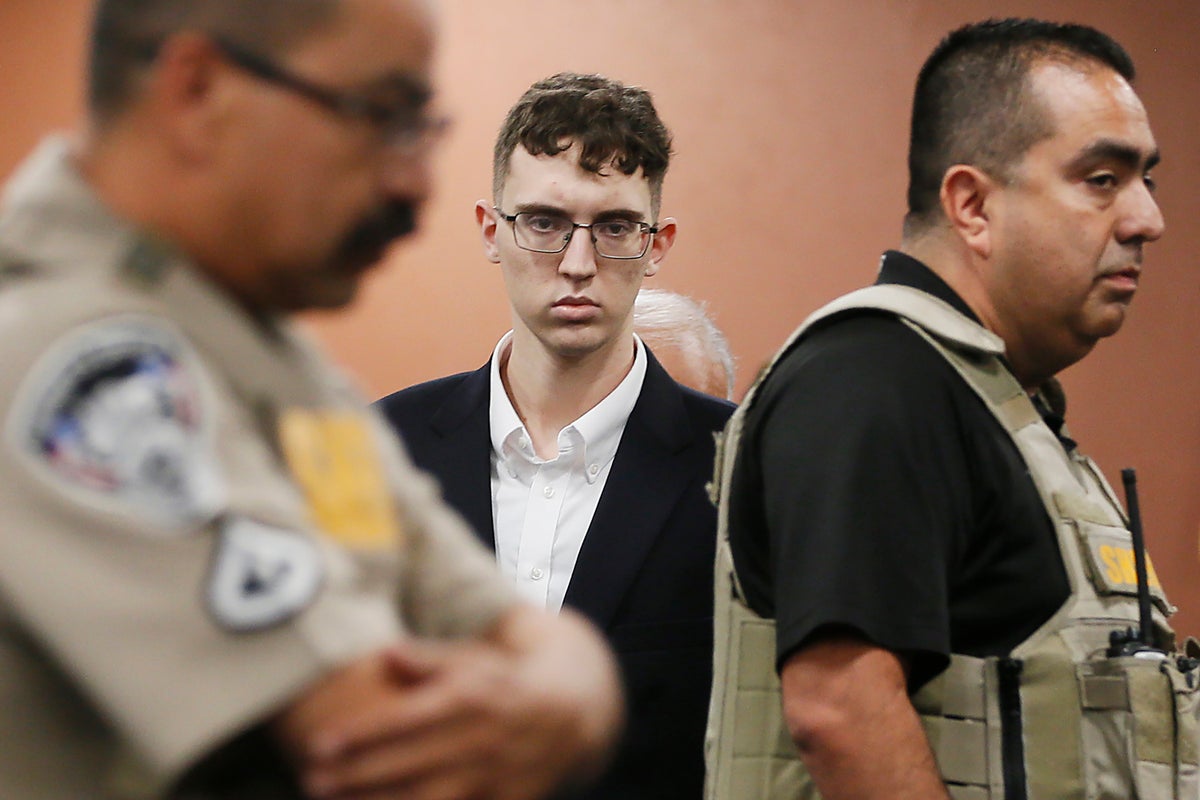
A white Texas gunman who killed 23 people at a Walmart in 2019 returns to court Wednesday for sentencing in a mass shooting that targeted Hispanic shoppers in the border city of El Paso.
Patrick Crusius, 24, is set to receive multiple life sentences after pleading guilty to federal hate crime and weapons charges in one of the deadliest mass shootings in U.S. history. Although the federal government did not seek the death penalty, Texas prosecutors have not taken lethal injection off the table under a separate case in state court.
Investigators say the shooting was preceded by Crusius posting a racist screed online.
The sentencing phase could last several days. It is the first time that relatives of the victims, who included citizens of Mexico, will have an opportunity to address Crusius face-to-face in court.
Some things to know about the shooting and the case:
WHO IS PATRICK CRUSIUS?
Crusius was 21 years old when authorities say he drove more than 10 hours from his home in an upper-class Dallas suburb to El Paso and opened fire.
The son of a licensed therapist and nurse, Crusius had been enrolled as a student at Collin College, near Dallas, and had no criminal convictions before the shooting. On social media, Crusius appeared consumed by the nation's immigration debate, tweeting #BuildtheWall and posts that praised then-President Donald Trump's hardline border policies.
His views went further in a document posted to an online message board about 20 minutes before the massacre in which he said the shooting was “in response to the Hispanic invasion of Texas.”
In American politics, Republicans have continued using the word “invasion” to describe migrants at the U.S.-Mexico border, waving off critics who say the rhetoric fuels anti-immigrant views and violence.
THE SHOOTING
Prosecutors say the Aug. 3, 2019, attack began in the parking lot on a busy weekend at a Walmart that is popular with shoppers from both Mexico and the U.S. Approaching the store, Crusius shot participants in a fundraiser for a girls' soccer team.
Inside, Crusius continued firing with an AK-47-style rifle, corning shoppers at a bank near the entrance where nine were killed, before shooting at the checkout area and people in aisles.
Crusius was apprehended shortly after the attack and confessed to officers who stopped him at an intersection, according to police.
More than two dozen people were injured and numerous others were severely traumatized as they hid or fled.
THE VICTIMS
The people who were killed range in age from a 15-year-old high school athlete to several elderly grandparents.
They included immigrants, a retired city bus driver, teachers, tradesmen including a former iron worker, and several Mexican nationals who had crossed the U.S. border on routine shopping trips. Witnesses recounted moments of terror, anguish and heroism.
An infant boy named Paul Anchondo narrowly survived with a broken hand as his parents were gunned down. Mother Jordan Anchondo is credited by relatives with shielding her baby.
David Johnson, 63, was killed after pushing his wife and 9-year-old granddaughter under a counter. The woman and child survived.
The funeral for one victim, 63-year-old Margie Reckard, drew thousands of sympathizers after her husband announced he had few relatives left and invited the world to attend.
TEST CASE
The sentencing arrives amid efforts by the Justice Department under President Joe Biden to more aggressively identify hate crimes and deliver meaningful results in the highest-profile cases.
The 2019 Walmart attack is the deadliest of a dozen mass shootings in the U.S. linked hate crimes since 2006, according to a database of mass killings in the U.S. compiled by The Associated Press, USA Today and Northeastern University.
Crusius agreed in February to accept up to 90 consecutive life sentences, avoiding the possible death penalty on charges of using a firearm in a crime of violence that causes death. Companion hate crime convictions against Crusius don’t carry the death penalty.
Federal prosecutors haven't formally explained their decision, but have acknowledged that Crusius suffered from schizoaffective disorder that can be marked by hallucinations, delusions and mood swings.
Adria Gonzalez, a 41-year-old El Paso native who survived the Walmart attack even as she helped panicked shoppers toward exits, says she fears that a life sentence won’t be enough to rein in racist attacks on Latinos.
“It’s not only him. There are other people, other groups that could hurt us,” she said.
WHAT'S NEXT
Crusius still faces capital murder charges in state court and could receive the death penalty if convicted.
It is unclear when that case will proceed. In November, El Paso County's former district attorney resigned over mounting criticism about her performance on the job, which included accusations that problems in her office were slowing down Crusius' case.
Also, victims' relatives have sued Walmart. Such lawsuits are common following mass shootings in the U.S. but typically face high hurdles to succeed.







